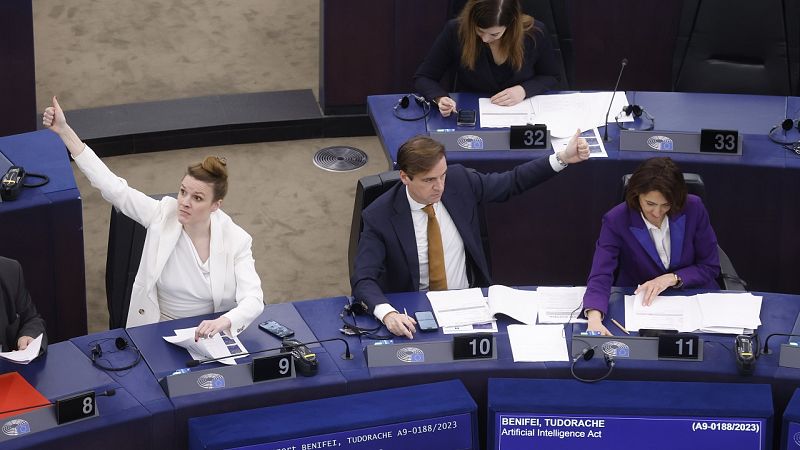Lawmakers reject Commission decision to scrap planned AI liability rules

Lawmakers on the European Parliament’s Internal Market and Consumer Protection Committee (IMCO) voted on Tuesday to keep working on liability rules for artificial intelligence products, despite the European Commission’s intention to withdraw the proposal.
Coordinators from the different political groups on the committee will push to keep the AI Liability Directive on the political agenda, a spokesperson for the Parliament confirmed.
The Legal Affairs committee, who leads the Parliament's work on this topic, has not yet decided what to do, the spokesperson added.
In the Commission’s 2025 work program, presented last week, the EU Executive said it plans to withdraw the AI Liability Directive because “no foreseeable agreement” is expected on the proposal.
The Commission indicated, however, that the file can remain on the table if parliament and EU Council undertake to do extensive work on it over the coming year.
It has not officially withdrawn the proposal.
Focus on the AI Act
The rules were proposed in 2022 in parallel with the EU’s AI Act, which aims to regulate artificial intelligence systems in line the risk they are deemed to pose to society, in a bid to modernise existing rules and ensure uniformity of protection across the EU.
Lawmakers were divided on how to proceed.
The lawmaker responsible for steering the AI Liability proposal through the parliament, German MEP Axel Voss, told Euronews last week that the Commission’s move was a “strategic mistake”.
However, another German lawmaker from the same centre-right European People’s Party expressed support for ditching the proposal, during the IMCO committee meeting on Tuesday.
Andreas Schwab said that more time was needed to see how the AI Act – which started to come into effect this year – will play out.
“The legislation needs to be watertight first,” Schwab said. “My idea would be to focus on the AI Act and see again in two years from now [if separate liability rules are needed].”
US influence
The centre-left groups were less convinced about the plans. Marc Angel (Luxembourg/S&D) – speaking on behalf of his Italian colleague Brando Benifei, the co-rapporteur of the AI Act – said the Commission decision was “disappointing.”
“Harmonized rules would have created a level playing field, fairness and clarity around Europe, offering consumers clarity when AI systems cause harm,” Benifei said.
“This also raises concerns about the direction of AI rules in the EU. [...] Europe must ensure that AI legislation offers real accountability and commitment. Pressure is not only coming from the industry but also from global allies,” he added.
Kim van Sparrentak (Netherlands/Greens), said the withdrawal of the proposal for rules on liability showed “a lack of understanding” about why it was first presented.
“It’s not to bully companies – it’s put forward to make sure that SMEs and people are protected,” she said. “I hope we can can…make it better for people and businesses in the EU.”
The Brussels tech lobby and consumer organisations were likewise divided about the need for additional rules.
Representatives of the tech industry have claimed that issues of liability are already covered under the revamped Product Liability Directive (PLD), while consumer groups welcomed the planned legislation.
A study by the Parliament’s research service, presented in the Parliament’s legal affairs committee (JURI) late January, pointed to problems that might arise as a result of large language models, including ChatGPT and Claude.ai, falling out of the scope of the current PLD.
Today

